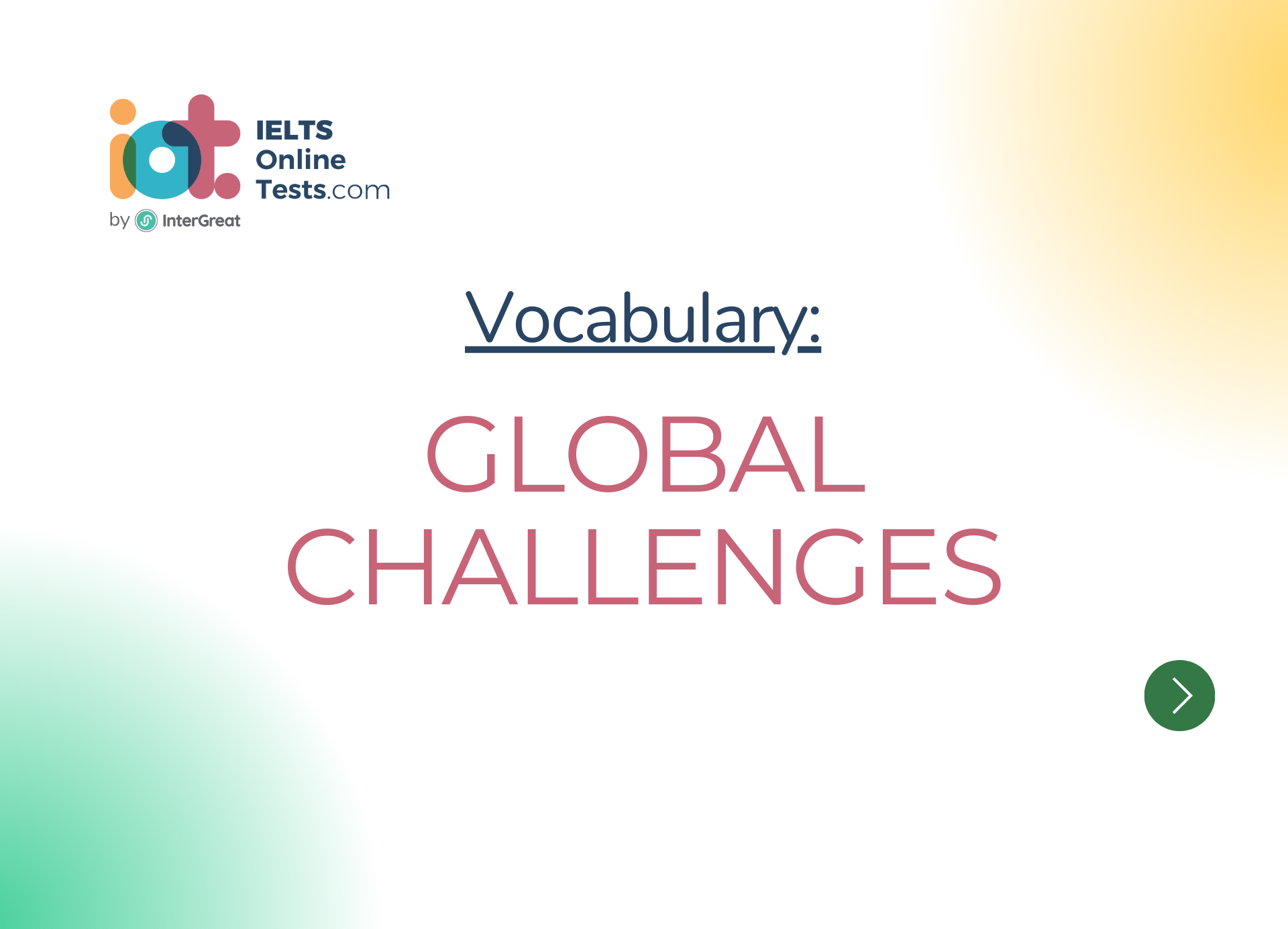
Global challenges
Here are some vocabulary words related to global challenges for IELTS band scores 4.5-6.0:
Climate Change:
The long-term alteration of Earth's climate, primarily due to human activities such as burning fossil fuels and deforestation.
Global Warming:
The increase in Earth's average temperature caused by the greenhouse effect and excessive emissions of greenhouse gases.
Environmental Degradation:
The deterioration of the environment and natural resources, often resulting from human activities.
Natural Disasters:
Catastrophic events caused by geological, meteorological, or hydrological forces, such as earthquakes, hurricanes, and floods.
Biodiversity Loss:
The decline in the variety and abundance of plant and animal species in ecosystems worldwide.
Overpopulation:
The condition where the human population exceeds the carrying capacity of Earth, leading to various environmental and social challenges.
Water Scarcity:
Insufficient access to clean, safe drinking water for human consumption and other purposes.
Food Crisis:
A shortage of food supply that affects a large number of people in a region or globally.
Energy Crisis:
A period of severe energy shortage or rising energy prices, impacting economies and societies.
Poverty:
The state of extreme deprivation and lack of access to basic needs, such as food, shelter, and education.
Inequality:
The uneven distribution of wealth, opportunities, and resources among different groups in society.
Economic Recession:
A period of significant economic decline, leading to reduced production, employment, and spending.
Globalization:
The increasing interconnectedness and interdependence of economies, cultures, and societies worldwide.
Cybersecurity:
Measures and practices to protect computer systems and networks from cyberattacks and unauthorized access.
Terrorism:
Acts of violence and intimidation used to instill fear and achieve political, religious, or ideological objectives.
Human Migration:
The movement of people from one place to another, often driven by economic, social, or political factors.
Pandemic:
An outbreak of a disease that occurs over a wide geographic area and affects an exceptionally high proportion of the global population.
Digital Divide:
The gap between those who have access to modern technology and the internet and those who do not.
Nuclear Proliferation:
The spread of nuclear weapons and technology to additional countries.
Refugee Crisis:
A situation where a large number of people are forced to leave their homes and seek refuge in other countries due to conflict or persecution.
Human Rights Violations:
Actions that infringe upon the basic rights and dignity of individuals, as recognized by international law.
Healthcare Access:
The availability and affordability of medical services and healthcare facilities for a population.
Pollution:
The introduction of harmful substances or contaminants into the environment, causing damage to ecosystems and human health.
Social Unrest:
Public dissatisfaction and protests against social and political issues, often leading to demonstrations and civil disobedience.
Trade Imbalance:
A situation where a country's imports exceed its exports or vice versa, leading to economic challenges.
Gender Inequality:
Discrimination and unequal treatment based on gender, particularly affecting women and girls.
Racial Discrimination:
Prejudice and bias against individuals or groups based on their race or ethnicity.
Climate Adaptation:
Strategies and measures to adjust and prepare for the impacts of climate change.
Sustainable Development:
Development that meets the needs of the present without compromising the ability of future generations to meet their own needs.
Renewable Energy:
Energy sources that can be replenished naturally, such as solar, wind, and hydroelectric power.
Child Labor:
The employment of children in hazardous or exploitative conditions, depriving them of their childhood and education.
Hunger and Malnutrition:
The condition of not having enough food or not getting adequate nutrition, leading to health problems.
Educational Disparities:
Unequal access to education and quality schooling, often linked to social and economic factors.
Digital Transformation:
The integration of digital technologies into various aspects of society and the economy.
Economic Inequality:
The unequal distribution of wealth and income among individuals and social groups.
Health Disparities:
Differences in health outcomes and access to healthcare services among different populations.
Cybercrime:
Criminal activities carried out through the internet, such as hacking, phishing, and identity theft.
Censorship:
The suppression or control of information and communication, often by governments or authorities.
Mass Surveillance:
The extensive monitoring and collection of data on individuals by governments or corporations.
Natural Resource Depletion:
The exhaustion and reduction of natural resources, such as fossil fuels and minerals.
Global Poverty:
Widespread poverty and destitution affecting people in various regions of the world.
Environmental Sustainability:
Practices that promote the protection and preservation of the natural environment.
Armed Conflicts:
Wars, armed confrontations, and violence between nations or within countries.
Political Instability:
Uncertainty and turmoil in the political landscape, often affecting governance and policymaking.
Digital Divide:
The gap between those who have access to modern technology and the internet and those who do not.
Nuclear Proliferation:
The spread of nuclear weapons and technology to additional countries.
Refugee Crisis:
A situation where a large number of people are forced to leave their homes and seek refuge in other countries due to conflict or persecution.
Human Rights Violations:
Actions that infringe upon the basic rights and dignity of individuals, as recognized by international law.
Healthcare Access:
The availability and affordability of medical services and healthcare facilities for a population.
Pollution:
The introduction of harmful substances or contaminants into the environment, causing damage to ecosystems and human health.
These vocabulary words will help you discuss and analyze various global challenges in your IELTS writing and speaking tasks. Make sure to understand their meanings and practice using them in context to enhance your language skills. Good luck with your studies!




